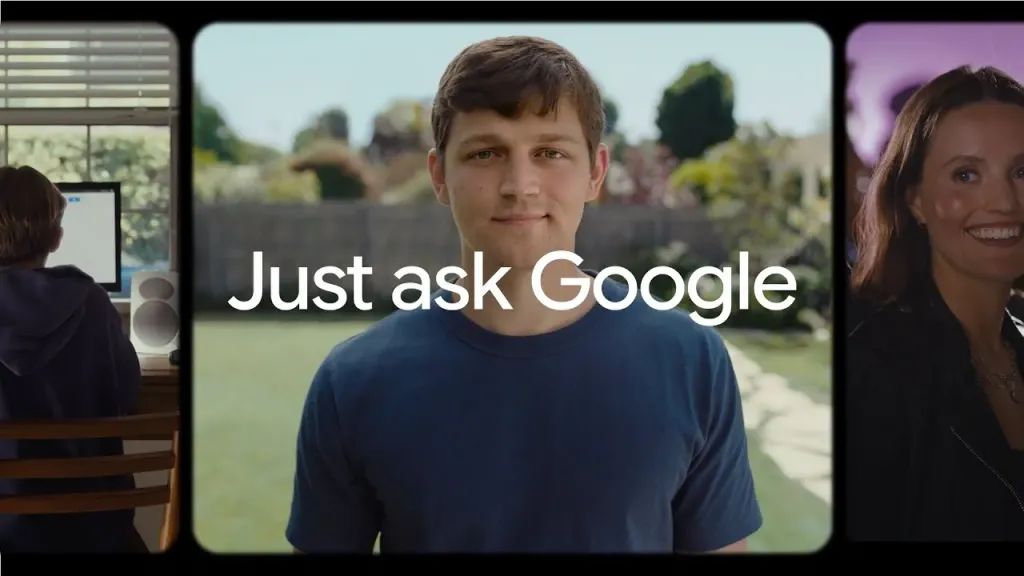A new Google ad shows a person surrendering his mind to AI instructions|video

We have a new entry in ever-growing canon of "Tech Companies Have No Idea How to Market AI."
Just ask Google. No, seriously: that's the name of tech colossus's newest ad campaign, "Just Ask Google," which is playing everywhere from TV spots to movie theaters.
In a particularly bonkers entry, the premise appears to be that, if you give over decision-making in your personal life to the hands of a large language model owned by a multi-trillion dollar company — there's now a disparaging term for such folks: "sloppers" — even a loser such as thee can find true love.
We wish we were kidding. The ad kicks off by trying to instill some nostalgia by telling us that Ted, our aimless everyman, was born in 1998, the "year of the first Google search." Fast forward to him as a kid, Googling "james blunt music video." The song "You're Beautiful" plays as his life, in the form of Google queries, flashes forward until he's an unfortunate 26-year-old, who has a huge house to himself, soul-searching in our age of predatory dating apps and AI sexbots. Tal Bachman's power pop anthem "She's So High" starts playing, for some reason.
Ted's just looking for "something cool" to do one night that gets him home at a "reasonable time," so he opens Google's "AI Mode" and asks for just that. The AI recommends attending James Blunt's anniversary tour (which is actually happening as we speak.) He goes to the show and — wouldn't you know it? — runs into the love of his life.
"Which is how Ted found something he didn't even know he was looking for," the narrator says. "Turns out, life's full of questions. Luckily, you can Just Ask Google."
The chorus of "She's So High" soars, inexplicably, while Ted is supposed to be at the James Blunt show (this ad clearly is also meant to be a tie-in for the English singer's tour, making the decision even more bizarre.) Maybe Google didn't expect us to know the difference between one pop rock song and another. Maybe it's a case of AI hallucination. This lazy ad storytelling earned Google a few clowning-ons in the comments.
"'She's So High' isn't a James Blunt song," observed one viewer. "If only technology existed we could use it to research facts like these..."
The important question, from a marketing point of view: is anyone convinced by this? Years on, AI companies still don't know how to sell you their shiny toys. AI can write emails for you and look stuff up, and what else? They have to dance around what people actually use these tools for, like having it be their friend (which can have disturbing consequences) or cheating on homework. They also ooze contempt for their audiences — just use our AIs to do everything, you dumb, single shmucks! And maybe stuff will actually happen in your life, for once.
Regarding Google's "AI Mode," is being a worse version of a Google search the best that this world-changing technology — which our entire economy is betting itself on — has to offer? And it is just an inferior Google search; large language models remain incredibly prone to hallucinating, or making up facts.
Speaking of: in a Super Bowl ad this year for its Gemini AI model, the chatbot produced a ridiculous statistic claiming that gouda cheese accounted for 60 percent of the world's cheese consumption (which Google ended up retroactively correcting, hoping no one would notice). It also generated text that turned out to be plagiarized. And this was in an expensively produced commercial that was supposed to show the AI at its absolute best. If errors are slipping through the cracks here, imagine all the nonsense that's being peddled across the millions of these searches that occur daily.
We also can't overlook the "Just Ask Google" ad's insidious implication that Google has been logging Ted's life since he was a kid, back when he was first looking up James Blunt music videos — which is how it knows to recommend he attend the James Blunt tour. With the AI making his life decisions and leading him to meeting his one true love, it's as if Google wants us to know it controls our destinies.




